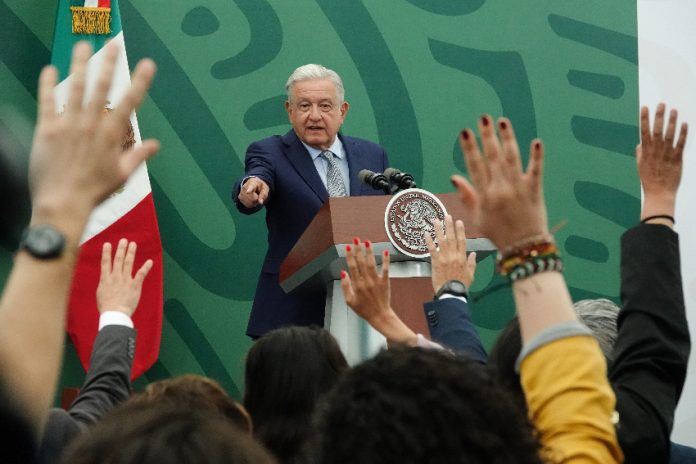Andrés Manuel López Obrador presided over his first morning press conference as president on Dec. 3, 2018, two days after he was sworn in.
On the vast majority of weekday mornings since then he has appeared before reporters to respond to questions and inform the nation – at considerable length – about the actions his government is undertaking to “transform” Mexico.
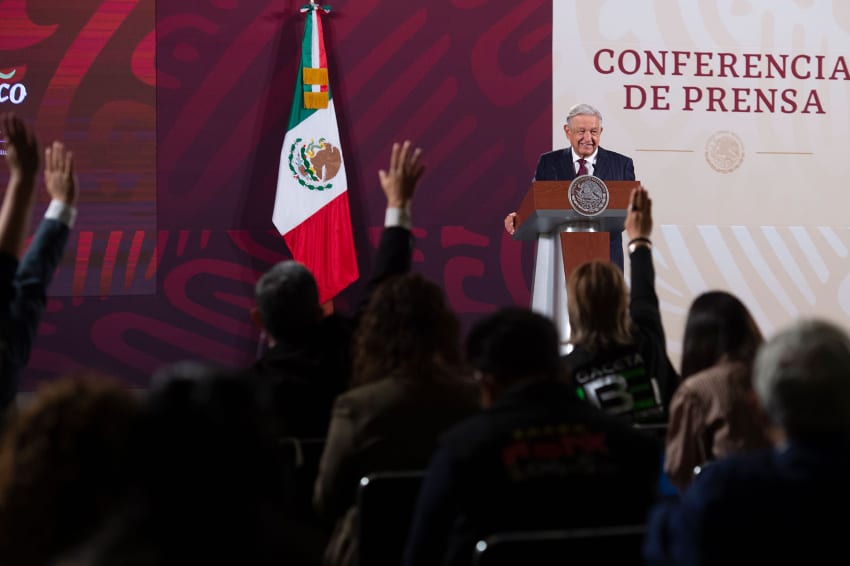
The president and his supporters say that the mañaneras – as the pressers are colloquially known – provide the government with the opportunity to convey indubitable, unfiltered information to the public, while critics denounce them as exercises in shameless propaganda.
Monday
Ricardo Sheffield, head of the consumer protection agency Profeco, began the presser with his weekly report on gasoline prices.
The average price across Mexico for a liter of regular gasoline last week was just over 22 pesos (about US $1.20), he said, noting that Redco, Oxxo Gas and Chevron had the highest prices and Total, Windstar and Rendichicas had the lowest and were therefore “allies of consumers.”
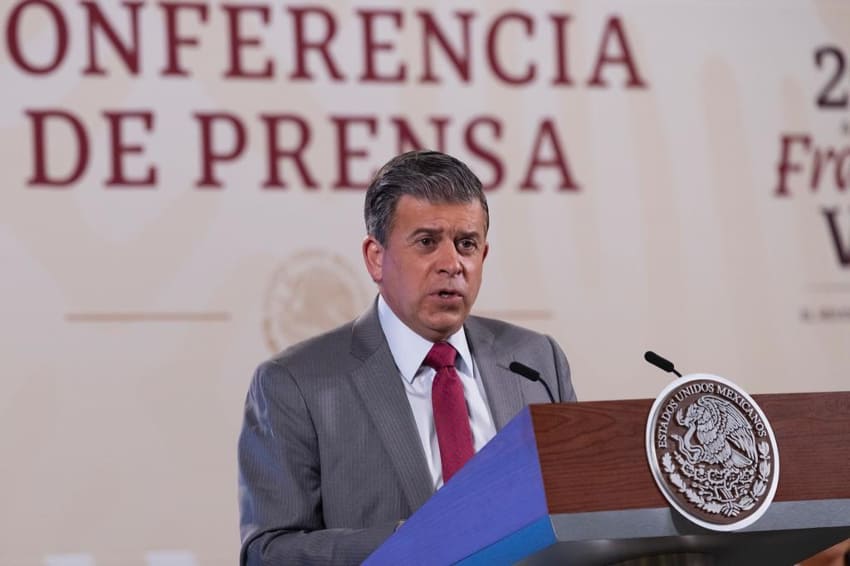
Sheffield, a former mayor of León, Guanajuato, ceded center stage to the director of the National Tourism Promotion Fund, Javier May, who declared that – despite claims to the contrary – construction of the Maya Train railroad will not damage the environment in the states through which it will run.
“Without a doubt, … the environment in southeastern Mexico will be a lot better than before,” he said after highlighting that cenotes (natural sinkholes), caverns and subterranean rivers “will be protected by the construction of viaducts and cable-stayed bridges” and fauna will have access to wildlife crossings.
May also said that the Maya Train project is “accompanied by the world’s largest reforestation program, Sembrando Vida, through which 50 million fruit and timber-yielding trees are being planted in the southeast of Mexico.”
During his engagement with reporters, López Obrador acknowledged an opinion article by former United States attorney general William Barr that was published by The Wall Street Journal last week under the headline “The U.S. must defeat Mexico’s drug cartels.”
“Barr says that I called off the [2019] arrest of the son of [Joaquín “El Chapo”] Guzmán Loera, Ovidio, because a group with 70 machine guns appeared. That’s exactly why I stopped [the operation] because there was going to be about 200 deaths and we’re not going to bet on massacres, on wars,” he said.
“That’s the mentality of hawks, of conservatives – wanting to resolve everything with the use of force. Violence can’t be combated with violence, evil can’t be confronted with evil, evil has to be confronted with good,” AMLO said.
Among subsequent remarks, López Obrador said he would leave a “list of pending reforms” for his successor as he doesn’t have enough time left as president to put forward all the legislative changes Mexico needs.
“I have to dedicate myself body and soul to finishing the [infrastructure] projects, consolidating the welfare programs and leaving the foundations well set for the transformation of the country,” López Obrador said.
“But other reforms are needed. For example, it’s clear that a reform is needed in the judicial power, but I can’t get involved in that because that power is currently a bastion of corrupt conservatism,” he said.
Toward the end of his press conference, AMLO noted that the value of the U.S. dollar dropped below 18 pesos on March 3 and reminded reporters that the government will hold an event in Mexico City’s central square, the Zócalo, on March 18 to mark the 85th anniversary of the nationalization of Mexico’s oil industry.
Events are also planned for International Workers’ Day on May 1 and Teachers’ Day on May 15, he said, asserting that the government’s “adversaries” won’t attend because they are “against” workers’ rights and public education.
Tuesday
Ninety minutes into the press conference, Tamaulipas Governor Américo Villarreal Anaya broke the news that two of four United States citizens who were kidnapped in Matamoros on March 3 had been found dead.
“One person is injured and the other is alive,” he said over the telephone as AMLO held Security Minister Rosa Rodríguez’s cell phone to a microphone.
“It’s very regrettable,” López Obrador said of the news before acknowledging that the United States government had the right to “speak out” against the incident, “as they did.”
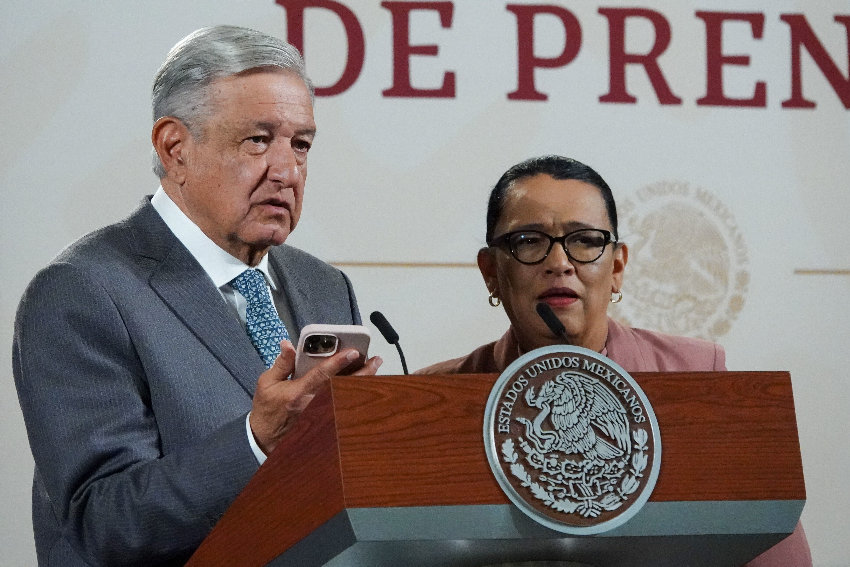
“We don’t want [things like this to happen]. We’re working every day to guarantee peace and tranquility and we going to continue working,” he said.
“We very much regret that this happens in our country and we send our condolences to the families and friends of the victims, to the people of the United States and to the United States government.”
Earlier in the presser, National Defense Minister Luis Cresencio Sandoval reported that the quantity of fentanyl seized since the government took office on Dec. 1 2018 was a whopping 1,049% higher than the amount confiscated in a comparable period during the government led by former president Enrique Peña Nieto.
A total of 6,115 kilograms of the synthetic opioid has been seized, he said. The army chief also noted that the quantity of methamphetamine seized had increased 92% to 180,995 kilograms.
Back behind the mañanera lectern, López Obrador sent a message to United States Congressman Dan Crenshaw, who has proposed deploying the U.S. military to fight drug cartels in Mexico.
“He should be attending to the causes in the United States that provoke the excessive consumption of drugs, especially fentanyl, which causes … the death of so many Americans,” he said.
Asked about the United States request for consultations on Mexico’s plan to phase out genetically modified corn imports, the president said that the government was seeking to reach an agreement with its U.S. counterpart so that health regulator Cofepris and a “qualified” U.S. agency can conduct an analysis to determine whether GM corn has a negative impact on human health.
“That’s what we’re proposing. Meanwhile, we won’t allow genetically modified corn to be consumed in Mexico,” AMLO said.
“… There is this consultation request but we still have a month and if there’s no understanding [reached] we’ll go to a [dispute] panel. … It’s a very important issue for us, it’s about the health of our people,” he said, adding that Mexico’s decision to phase out imports of GM corn for human consumption doesn’t violate its commitments under the USMCA free trade pact.
“No agreement in the world allows goods that are harmful to health to be bought or sold,” López Obrador said.
“In the … [USMCA] there are clauses that protect consumers, just as the environment and workers are protected,” he explained.
Wednesday
During opening remarks on International Women’s Day, AMLO declared that his government supports “women’s fight in defense of their rights” and asserted that a lot of progress has been made in the area in Mexico.
He also said that women are making an important contribution to the “transformation” his government is carrying out.
“In the government I represent there are more women in crucial roles,” said López Obrador, who has eight women in his 19-member cabinet.
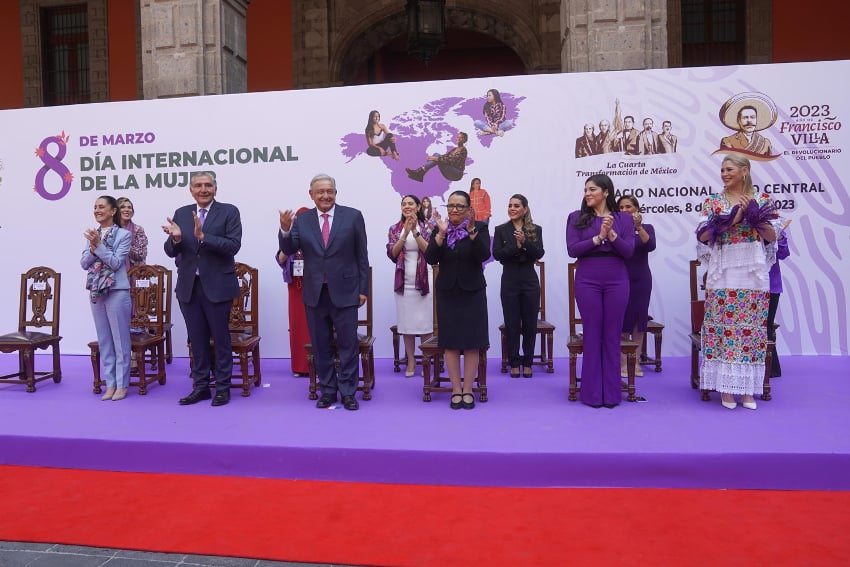
He added that 70% of the government’s “servants of the nation” – low-ranking officials responsible for the on-the-ground implementation of social programs – are women.
“We attach importance to desk work, but a lot more importance is given to … the work that’s done house by house, work that is done in the streets, in the communities, in the towns. … The transformation we’re carrying out is from the bottom up and with the people, and the driving force of this change is women,” AMLO said.
He also extolled the virtues of social media and his own weekday press conferences.
Despite its “defects,” social media has “emerged as a blessing in recent times,” said López Obrador, who has close to 10 million followers on both Facebook and Twitter.
“It’s more open [than traditional media] and any citizen can speak out. … That didn’t exist before. It was just The New York Times, The Washington Post, The Wall Street Journal, The Financial Times, Excélsior, El Universal, Televisa, [TV] Azteca, W [Radio], Radio Fórmula and that was it,” he said.
“Now … [we have] social media and the mañanera. What would the information situation be in Mexico if the mañanera didn’t exist?”
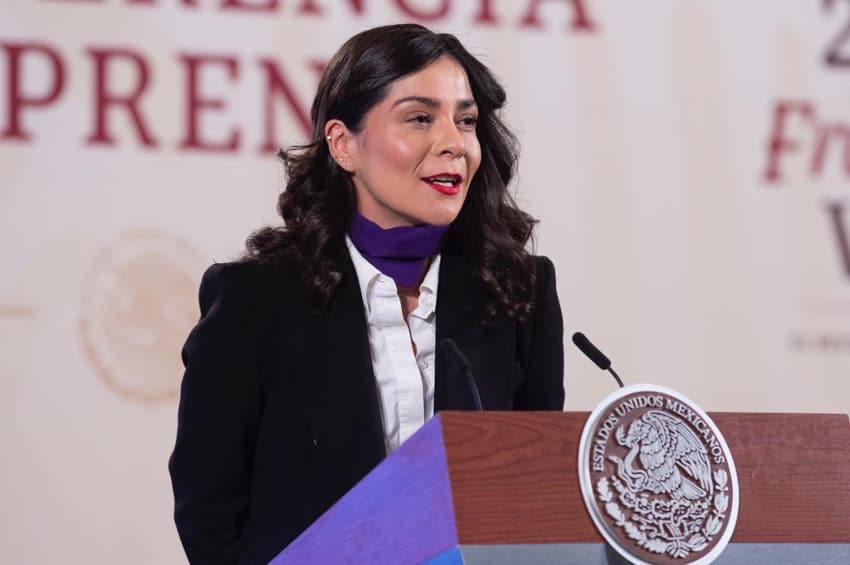
One of the newspapers AMLO mentioned was the target of the wrath of the government’s media monitor when she took center stage to present her “Who’s who in the lies of the week” segment. “Everything” in a Wall Street Journal published under the headline “The narco threat to Mexican democracy” is “false,” Ana García Vilchis declared.
“The journalist Mary Anastasia O’Grady warned … that the [recently-approved] electoral reform weakens the National Electoral Institute [INE], which could result in insecurity at the next elections because drug traffickers could take advantage and increase the theft of ballot boxes as well as threats and murders of candidates that don’t agree with their plans,” she sad.
“She also says, ‘Now [AMLO] wants to slay the electoral watchdog, which may be one of the last lines of defense against a narco-state.’ What do you know? Curiously this text is supported by a report drawn up by the [opposition] PRI, PAN and PRD [parties], where alleged acts of terrorism are reported. However, the scenario painted by the U.S. media outlet is part of the fake news that is circulating to attack President López Obrador,” García said.
“To the people of Mexico we reiterate: the electoral reform is limited to modifying the structure of the INE; it doesn’t affect its functionality nor limit the fulfillment of its tasks,” she added.
Thursday
“Good morning, we’re late because we got a cleansing, a good incense smoke cleansing,” López Obrador joked at the beginning of his press conference because it was being held in what he calls the “bunker” of former security minister and convicted drug trafficker Genaro García Luna.
“… National and foreign visitors came here,” he said of the erstwhile police intelligence center located near Chapultepec Park in Mexico City.
“But it was a complete sham, they weren’t working to pacify Mexico, [the bunker] was just a front. And it was very costly. You’ll see how much it cost,” AMLO said, adding that contracts for its construction were assigned directly without a competitive tendering process.
Security Minister Rosa Icela Rodríguez later reported that construction of the facility – now occupied by the National Guard – cost an estimated 3.34 billion pesos (about US $185 million at the current exchange rate).
#GarcíaLuna construyó un túnel para conectar su oficina con el #búnker, un espacio que no alcanzó su objetivo de integrar los sistemas nacionales en una sola base de datos. pic.twitter.com/ixMZVsMn6I
— Rosa Icela Rodríguez Velázquez (@rosaicela_) March 9, 2023
A video posted to the public security ministry’s Twitter account showing the “bunker”, now occupied by the National Guard.
It was opened in November 2009 – during the presidency of Felipe Calderón – and “presented as the Federal Police Intelligence Center,” she said, noting that it has above-ground and underground sections and was “supposedly connected to more than 600 points in the country and 169 Federal Police offices and stations.
“… The reality … is that this space was mainly used by García Luna … to show off the supposed intelligence strength and work of the Federal Police. They filled this center with screens to impress people,” Rodríguez said.
“Then president Felipe Calderón publicly declared that, based on the United States police series 24, he decided to build a technological system like that he saw on television. The person in charge of fulfilling this idea was García Luna, who at that time was said to be the best police officer in Mexico but who today lies imprisoned in jail in Brooklyn, New York,” she said.
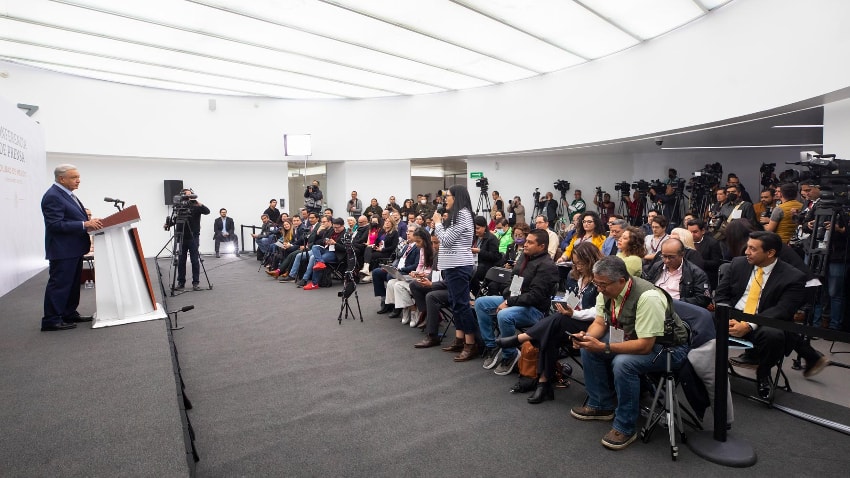
Turning to non-“bunker” related matters, AMLO made it clear that his government wouldn’t allow the U.S. military to come into Mexico to combat drug cartels, as some Republican Party lawmakers have proposed.
He challenged those lawmakers to change their attitude toward Mexico, “or starting today we’ll begin an information campaign in the United States so that all the Mexicans [who live there], our compatriots, know about this treachery, this aggression from the Republicans toward Mexico,” he said.
“If they continue with this attitude we’ll insist that not one vote from Mexicans, from Hispanics, [is cast in favor of the Republican Party],” López Obrador said.
He added that Mexico could take a complaint about the military intervention proposal to the United Nations.
“[First] we want to see the reaction of other lawmakers from the Republican Party, see what they think,” AMLO said.
Friday
After previewing Mexico’s match against Colombia in the World Baseball Classic on Saturday, López Obrador was forced to turn to a much more serious issue: allegations that the Ministry of National Defense (Sedena) used spyware against journalists and a human rights defender during the term of the current government.
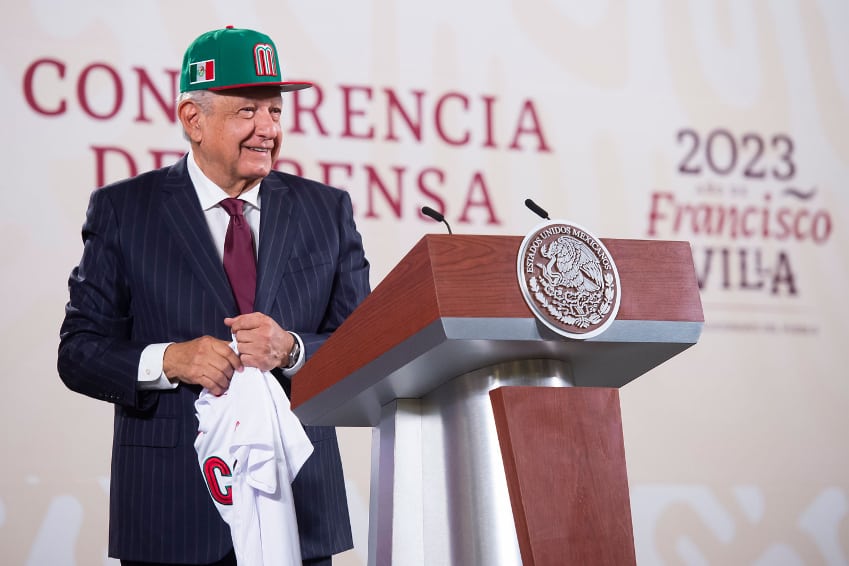
A reporter informed AMLO that “official documents” were published on Tuesday “that confirm Sedena spied on civilians in your six-year term despite this being illegal.”
“The first thing I’d like to ask you, president, is whether you were informed of this and whether you authorized it,” said Nayeli Roldán of the news website Animal Político.
“Investigation must be carried out, not espionage, which is different,” López Obrador responded.
“… We maintain that carrying out investigations, doing intelligence [work] is very important in order to not use force [against alleged criminals], intelligence is better than force,” he said.
The president denied that the army had done anything illegal, saying that it had only carried out intelligence work with the National Intelligence Center in order to “know about movements and operations of organized crime.”
“… We don’t spy on anyone, it’s not the time of the neoliberal governments. We made the commitment not to spy on any opponent. The case you are mentioning of this human rights defender [Raymundo Ramos] was reported here by a colleague of yours, pointing out that he has ties, alleged ties with crime groups in Tamaulipas,” AMLO said.
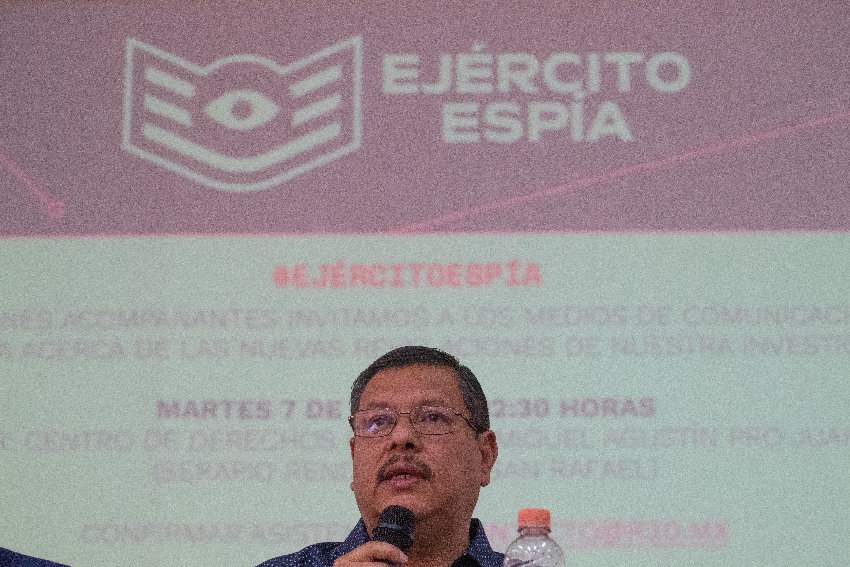
Questioned about alleged spying on two journalists, López Obrador asserted that there is “no instruction” to spy on any journalist and attributed the entire Ejército Espía (The Spy Army) investigation – carried out by media outlets and civil society organizations – to a desire to discredit his government.
“… Journalism is useful to citizens when it’s professional and objective, when it’s close to the people and far from power, but your journalism isn’t close to the people, you’re at the service of the oligarchy, of those who felt they were the owners of Mexico, those who dedicated themselves to looting Mexico,” he said during a lengthy exchange with Roldán.
In response to subsequent questions, AMLO said that school dropout rates had declined “considerably” largely due to the availability of government scholarships for students and declared that a “thorough” investigation into the Matamoros case involving four U.S. citizens was taking place.
He also said he had a “very good” meeting on Thursday with United States Homeland Security Adviser Elizabeth Sherwood-Randall.
“We addressed the fentanyl issue, [smuggling of] weapons [into Mexico] and the issue of respect for the sovereignty of our country,” AMLO said, alluding to the calls for the U.S. military to combat Mexican cartels.
“… On Monday Foreign Affairs Minister Marcelo Ebrard will preside over a meeting in Washington with all the consuls of Mexico in the United States to report what we’re doing to support the U.S. so that fentanyl doesn’t arrive,” the president added.
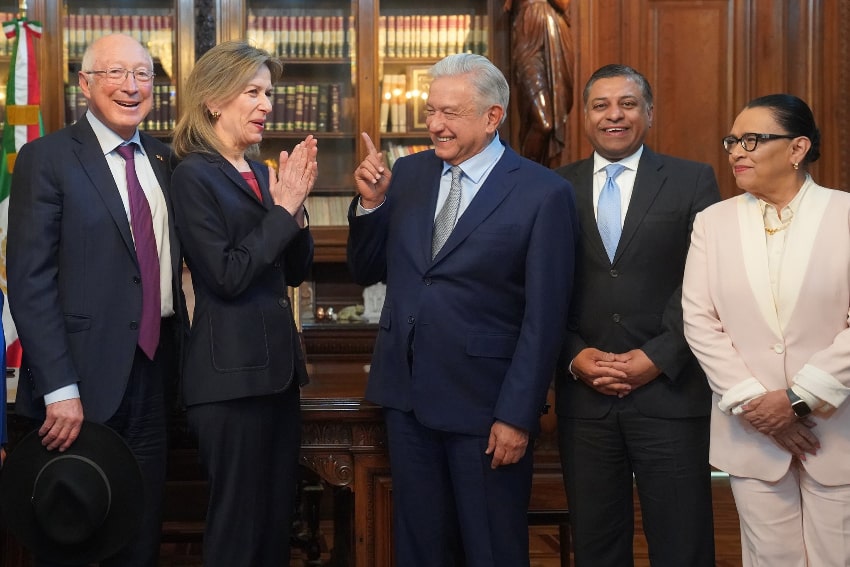
“It will be reported that in our time [in government] the largest amount of fentanyl has been confiscated, six tonnes. Do the math, … each kilo of fentanyl is a million doses and what we’ve seized is six tonnes – 60,000 kilograms,” López Obrador said without acknowledging his multiplication mistake.
Mexico News Daily
